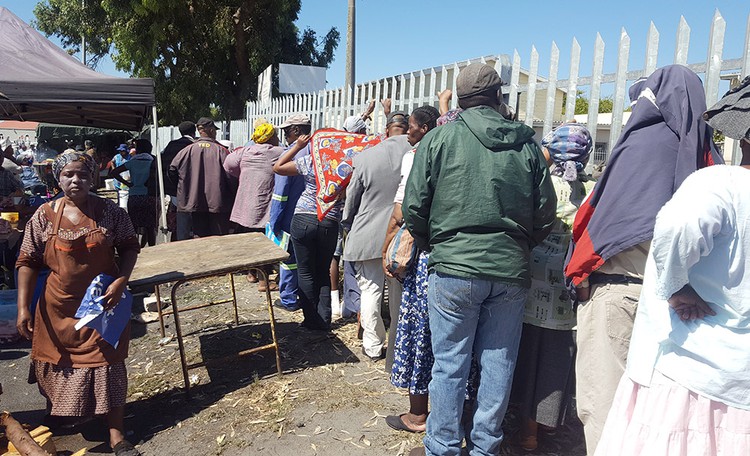
People queue for social grants. Archive photo: Mary-Anne Gontsana
4 August 2017
On 20 July 2017, Black Sash appealed against a judgment that permits Net1 to continue to allow deductions from the social grants it administers. The appeal has been lodged with the Supreme Court of Appeal (SCA) after Justice Van der Westhuizen, who decided the initial application, denied leave to appeal in the Pretoria High Court.
The matter began when Net1 and some of its subsidiaries filed an application challenging new Regulations that prohibited EFTs, debit and stop orders from being made from grant recipient bank accounts. Under the Regulations, a “method of payment” may not make any deductions from social grants except deductions for funeral cover if these deductions are less than 10% of the grant amount. In effect, the Regulations attempted to limit whether companies would be allowed to make deductions from social grants.
Under the current structure of the social grants system, Cash Paymaster Services administers the funds for social grants and pays them into SASSA Fund Accounts at Grindrod Bank. In SASSA and the Minister of Social Development’s view, the Grindrod accounts were a “method of payment” and could not have deductions made against them. As a result, SASSA instructed CPS and Grindrod to stop processing debit orders on beneficiary accounts.
CPS and Grindrod refused to comply with this instruction and they, along with Net1 were charged with committing a criminal offence under the Social Assistance Act, 2004. They then filed a court application, arguing that the Minister’s interpretation of the Regulations and Act was incorrect in that the Minister did not have the authority to restrict debit orders.
During the case, the Minister conceded that the regulations restricting debit orders and deductions would not apply to accounts held at other banking institutions. It was on the basis of this concession that Van der Westhuizen decided that SASSA’s interpretation of the Regulations was not just incorrect but “unbusinesslike” and “insensible”. Van der Westhuizen found that if the Minister’s interpretation were to be applied, the Minister would be regulating things that fell within the Reserve Bank’s domain. The judgment also seemed concerned that prohibiting deductions would result in non-payment of creditors, placing greater emphasis on repayment of creditors above making sure that social grant money was actually received by recipients.
A number of parties, including Black Sash, had applied to intervene as friends of the court and make submissions on the public interest issues raised by this case. Black Sash had applied for an order that confirmed that the state had a constitutional obligation to protect social grant beneficiaries from exploitation and direct the Minister to make regulations that would protect recipients from these exploitative practices.
Van der Westhuizen, however, did not allow any of the parties to join – despite the fact that these applications were not opposed and that he had allowed Net1 to file additional papers in response to their submissions. In addition, Van der Westhuizen did not consider any of the submissions made by these intervening parties, finding them to be irrelevant. From his judgment, it appears that Van der Westhuizen only took business and financial considerations into account and failed to recognise a history of predatory practices by a number of companies, including Net1 subsidiaries, that have seen excessive, unauthorised deductions leave recipients without the grants they need.
Following the judgment, Black Sash filed an application for leave to appeal in the High Court that was refused by Van der Westhuizen. As a result, the Black Sash was forced to approach the SCA to apply for leave to appeal.
Its application to the SCA highlighted the thousands of complaints Black Sash has received of how various companies have levied exploitative deductions from social grants. Black Sash contends that Van der Westhuizen erred in not allowing it to intervene as friends of the court as well as dismissing its application. Black Sash is also arguing that Van der Westhuizen was incorrect to find that its submissions and application were irrelevant. Van der Westhuizen gave no reasons for this finding. Black Sash highlighted that the interpretation of the Act and Regulations will potentially affect millions of social grant beneficiaries.
The Supreme Court of Appeal will only grant leave to appeal if there is a reasonable prospect that the appeal will succeed.